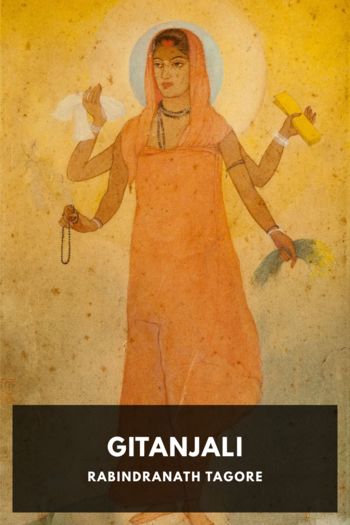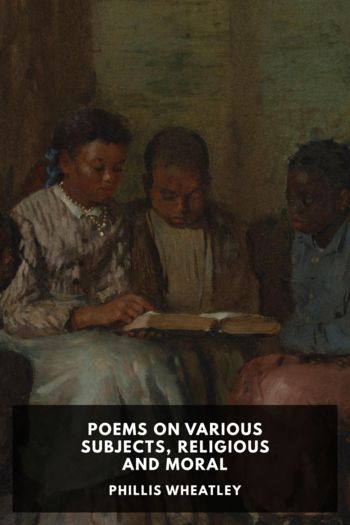My Reminiscences by Rabindranath Tagore (free children's ebooks pdf .TXT) 📕

- Author: Rabindranath Tagore
Book online «My Reminiscences by Rabindranath Tagore (free children's ebooks pdf .TXT) 📕». Author Rabindranath Tagore
In the riotous joy of this revolutionary activity were these two musical plays composed, and so they danced merrily to every measure, whether or not technically correct, indifferent as to the tunes being homelike or foreign.
On many an occasion has the Bengali reading public been grievously exercised over some opinion or literary form of mine, but it is curious to find that the daring with which I had played havoc with accepted musical notions did not rouse any resentment; on the contrary those who came to hear departed pleased. A few of Akshay Babu’s compositions find place in the Valmiki Pratibha and also adaptations from Vihari Chakravarti’s Sarada Mangal series of songs.
I used to take the leading part in the performance of these musical dramas. From my early years I had a taste for acting, and firmly believed that I had a special aptitude for it. I think I proved that my belief was not ill-founded. I had only once before done the part of Aleek Babu in a farce written by my brother Jyotirindra. So these were really my first attempts at acting. I was then very young and nothing seemed to fatigue or trouble my voice.
In our house, at the time, a cascade of musical emotion was gushing forth day after day, hour after hour, its scattered spray reflecting into our being a whole gamut of rainbow colours. Then, with the freshness of youth, our newborn energy, impelled by its virgin curiosity, struck out new paths in every direction. We felt we would try and test everything, and no achievement seemed impossible. We wrote, we sang, we acted, we poured ourselves out on every side. This was how I stepped into my twentieth year.
Of these forces which so triumphantly raced our lives along, my brother Jyotirindra was the charioteer. He was absolutely fearless. Once, when I was a mere lad, and had never ridden a horse before, he made me mount one and gallop by his side, with no qualms about his unskilled companion. When at the same age, while we were at Shelidah, (the headquarters of our estate), news was brought of a tiger, he took me with him on a hunting expedition. I had no gun—it would have been more dangerous to me than to the tiger if I had. We left our shoes at the outskirts of the jungle and crept in with bare feet. At last we scrambled up into a bamboo thicket, partly stripped of its thorn-like twigs, where I somehow managed to crouch behind my brother till the deed was done; with no means of even administering a shoe-beating to the unmannerly brute had he dared lay his offensive paws on me!
Thus did my brother give me full freedom both internal and external in the face of all dangers. No usage or custom was a bondage for him, and so was he able to rid me of my shrinking diffidence.
XXX Evening SongsIn the state of being confined within myself, of which I have been telling, I wrote a number of poems which have been grouped together, under the title of the Heart-Wilderness, in Mohita Babu’s edition of my works. In one of the poems subsequently published in a volume called Morning Songs, the following lines occur:
There is a vast wilderness whose name is Heart;
Whose interlacing forest branches dandle and rock darkness like an infant.
I lost my way in its depths.
from which came the idea of the name for this group of poems.
Much of what I wrote, when thus my life had no commerce with the outside, when I was engrossed in the contemplation of my own heart, when my imaginings wandered in many a disguise amidst causeless emotions and aimless longings, has been left out of that edition; only a few of the poems originally published in the volume entitled Evening Songs finding a place there, in the Heart-Wilderness group.
My brother Jyotirindra and his wife had left home travelling on a long journey, and their rooms on the third storey, facing the terraced-roof, were empty. I took possession of these and the terrace, and spent my days in solitude. While thus left in communion with my self alone, I know not how I slipped out of the poetical groove into which I had fallen. Perhaps being cut off from those whom I sought to please, and whose taste in poetry moulded the form I tried to put my thoughts into, I naturally gained freedom from the style they had imposed on me.
I began to use a slate for my writing. That also helped in my emancipation. The manuscript books in which I had indulged before seemed to demand a certain height of poetic flight, to work up to which I had to find my way by a comparison with others. But the slate was clearly fitted for my mood of the moment. “Fear not,” it seemed to say. “Write just what you please, one rub will wipe all away!”
As I wrote a poem or two, thus unfettered, I felt a great joy well up within me. “At last,” said my heart, “what I write is my own!” Let no one mistake this for an accession of pride. Rather did I feel a pride in my former productions, as being all the tribute I had to pay them. But I refuse





Comments (0)